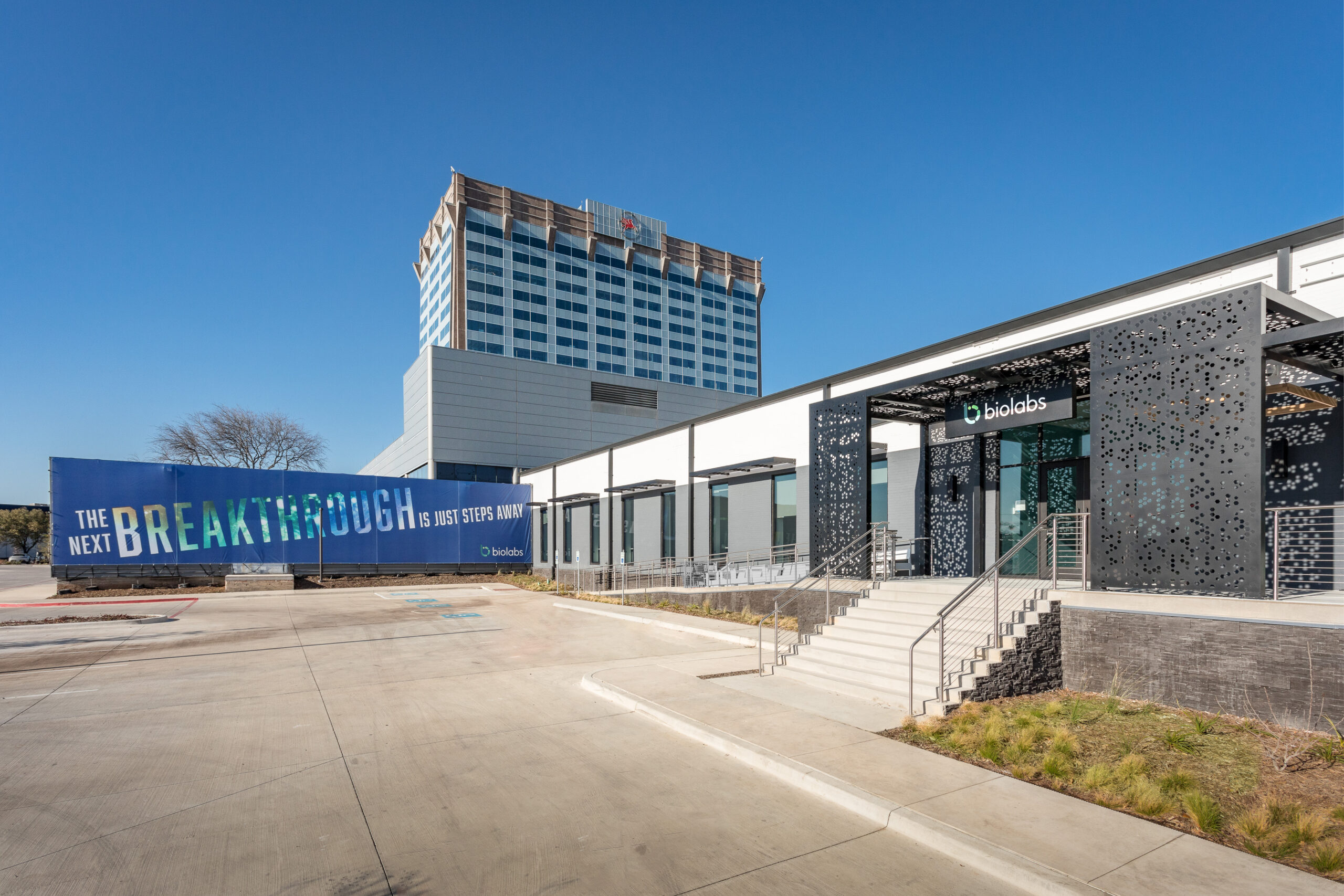It’s been a busy week for everyone concerned with a proposed, $1.6 billion merger between Charles River Laboratories International Inc. (NYSE: CRL) and WuXi PharmaTech (Cayman) Inc. (NYSE:WX).
Aiming to counter stiff opposition from some of its top institutional investors, Charles River Labs issued a revised presentation this week highlighting the benefits of the deal and touted a proxy advisory firm’s support for the merger.
But the PR offensive didn’t sway Jana Partners LLC and managing partner Barry Rosenstein, who fired off a letter to CRL chairman, president and CEO James Foster today reiterating his opposition to the deal.

BioLabs Pegasus Park Cultivates Life Science Ecosystem
Gabby Everett, the site director for BioLabs Pegasus Park, offered a tour of the space and shared some examples of why early-stage life science companies should choose North Texas.
One of the things Charles River Labs emphasized in the investor presentation was the estimated $75 million to $100 million in annual “revenue synergies” the deal is expected to generate. Rosenstein called those predictions “speculative at best,” saying they “run counter to industry perceptions of the transaction as well as practical industry dynamics.”
“Even assuming such synergies were plausible, given the excessive premium Charles River proposes to pay for Wuxi, this transaction if completed would generate highly inadequate returns,” Rosenstein wrote, adding “Charles River’s prior acquisition history and inadequate returns on capital despite significant expenditures over the years are cause for further alarm in evaluating the proposed acquisition, particularly given the significant strategic and integration risks of a WuXi acquisition.”
Rosenstein wants Wilmington, Mass.-based Charles River Labs to pursue other ways to increase the company’s value, including a stock buyback or the proverbial “strategic alternatives” — shorthand for seeking an acquirer.
As for Charles River Labs’ move to drum up support by citing favorable reactions from customers to news of the deal, Rosenstein countered with a few citations of his own from investment analysts Raymond James & Associates and Deutsche Bank Securities Inc.:

With the Rise of AI, What IP Disputes in Healthcare Are Likely to Emerge?
Munck Wilson Mandala Partner Greg Howison shared his perspective on some of the legal ramifications around AI, IP, connected devices and the data they generate, in response to emailed questions.
- “Raymond James: ‘During our conversations with industry participants, the subject of the Charles River-Wuxi proposed merger often emerged. From the strategic perspective of synergies between discovery services and existing preclinical capabilities, we did not encounter a single individual who agreed with the transaction and/or thought that it would clearly provide a benefit to the resulting entity. In our view, this further validates investor concerns over the merits of the transaction.'”
- “Deutsche Bank: ‘We view today’s attempt by management to place a medium-term target on revenue synergies as a means of garnering additional support for a transaction that we believe is not broadly favored by shareholders. We would also note that revenue synergies tend to be elusive in nature and particularly hard to capture relative to service based transactions. Therefore, we expect shareholders to discount the revenue synergy potential of the transaction and remain generally against the proposed [WuXi] transaction.'”
Rosenstein’s letter didn’t address PROXY Governance Inc.’s report urging shareholders to approve the issuance of stock necessary to consummate the deal. The proxy advistory firm said it found the strategic arguments behind the deal “compelling” and predicted the long-term results would eclipse any increased value generated by a share repurchasing plan.
Jana Partners was first out of the gate in opposing the deal after it was announced in April. In a June 7 letter to company officials, Rosenstein said he had “serious doubts about the wisdom of pursuing this transaction at this time.” In particular, Rosenstein said Charles River’s current low share price would give WuXi a disproportionately large share of the combined companies — equaling a nearly 27 percent stake at CRL’s price of around $32.44 a share.
Charles River Labs was quick to defend the deal. CEO James Foster wrote that the buyout would increase long-term top- and bottom-line growth for CRL, compared with doing nothing or the share repurchasing plan favored by Jana.
Two other institutional investors, Neuberger Berman LLC and Relational Investors LLC, failed to buy into those arguments and also chimed in with their objections.
“Between the stock price reaction and shareholders’ disapproval, it should be clear to management and the board that walking away from this transaction is the right thing to do,” Relational principal and managing director Glenn Welling told the Reuters news service. “We hope they get the message.”
“Without belaboring the point and put simply, the very rich price being paid for WuXi allows for no margin of error. In our opinion, the proposed transaction with WuXi represents an unacceptable elevation of financial and operational risks to CRL, and therefore, our investment,” added Neuberger Berman, according to a regulatory filing.
Citing Charles River’s 2004 buyout of Inveresk for $1.5 billion, which was plagued by integration difficulties and saw CRL sell off significant portions of the acquisition just two years later, the investment firm said it was “perplexed” that CRL would embark on another, massive acquisition.
“The Inveresk transaction was also billed as transformational, promising to accelerate the growth and size of available markets to the company. Instead, the transaction resulted in a $700 MM write-off with growth and consistent profitability remaining elusive in the company’s pre-clinical operations,” Neuberger Berman wrote, according to the filing. “CRL’s management needs to demonstrate that its current assets can generate returns well in excess of its cost of capital before being allowed to spend $1.6B of capital. We firmly believe that that the CRL’s shares are significantly undervalued and that a bright future lies ahead for the core businesses of CRL. In our view, a free cash flow financed share repurchase program would demonstrate confidence in CRL’s current asset base and be an excellent use of capital.”
Also this week, the Federal Trade Commission asked both companies for more information on the deal, requesting more data on their viral clearance services, cell line characterization services and lot release testing services businesses.
The Massachusetts Medical Devices Journal is the online journal of the medical devices industry in the Commonwealth and New England, providing day-to-day coverage of the devices that save lives, the people behind them, and the burgeoning trends and developments within the industry.












